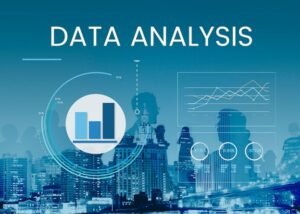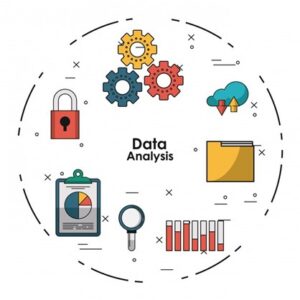Unlocking the Power of Data Analytics in Auditing

Data Analytics in Auditing
Data analytics in auditing is transforming the auditing profession, enabling auditors to identify and assess risks more effectively, and to provide more insightful and reliable opinions on financial statements. It is the process of using statistical, mathematical, and computational methods to extract knowledge and insights from data. In auditing, it can be used to:
- Identify and assess risks of material misstatement
- Develop audit plans and procedures
- Evaluate audit evidence
- Form an opinion on the financial statements
Benefits of Data Analytics in Auditing
It can offer a number of benefits of data analytics in auditing, including:
- Increased efficiency: Data analytics can help auditors to automate tasks and identify risks more quickly and easily.
- Improved accuracy: Data analytics can help auditors to identify risks more accurately and to gather more reliable audit evidence. This can help to reduce the risk of material misstatement in the financial statements.
- Enhanced insights: Data analytics can help auditors to gain deeper insights into a company’s financial data. This can help auditors to identify risks that may not be apparent from traditional auditing methods.
The specific benefits of data analytics in auditing will vary depending on the size and complexity of the business, as well as the industry in which it operates.
Challenges of Using Data Analytics in Auditing
The challenges of using data analytics in auditing include: the availability, quality, and relevance of data; the skills and expertise of auditors; and the ability to interpret the results of data analytics in auditing.
- Data quality: The quality of the data is critical. If the data is inaccurate or incomplete, the results of the analysis will be unreliable.
- Technical expertise: It requires a high level of technical expertise. Auditors may need to acquire new skills and knowledge in order to use data analytics effectively.
- Audit risk: It can introduce new audit risks, such as the risk of bias or the risk of misinterpreting the results of the analysis. Auditors need to carefully consider these risks and take steps to mitigate them.
The challenges of using data analytics in auditing is still in its early stages, and there is a need for more research and development to address the challenges involved.

Best Practices for Using Data Analytics in Auditing
To use best practices for using data analytics in auditing, auditors should follow a number of best practices, including:
- Understand the data: Auditors need to have a deep understanding of the data. This includes understanding the data’s limitations and potential biases.
- Use appropriate techniques: Auditors should use appropriate techniques for the task at hand. There is no one-size-fits-all approach to data analytics in auditing.
- Test the results: Auditors should test the results to ensure that they are reliable. This includes testing the assumptions that were made and the data that was used.
- Document the process: Auditors should document the process. This will help to ensure that the analysis can be replicated and that the results can be defended.
Future of Data Analytics in Auditing
It is still a relatively new field in auditing, but it is rapidly gaining in popularity.
In the future, it is likely to be used to:
- Automate more tasks in the audit process
- Identify and assess risks more effectively
- Gather more reliable audit evidence
- Provide more insightful and reliable opinions on financial statements
It has the potential to transform the auditing profession, making it more efficient, accurate, and insightful.
How can data analytics in auditing help auditors identify risks more effectively?
It can help auditors to identify risks more effectively by identifying patterns and trends in data.
- For example, data analytics can be used to identify unusual transactions or events that may be indicative of fraud or other financial irregularities.
What is the future of data analytics in auditing?
It is still a relatively new field in auditing, but it is rapidly gaining in popularity. As the volume and complexity of data continues to grow, data analytics in auditing is likely to become an even more essential tool.
What are some specific examples of how data analytics data analytics in auditing?
Here are some specific examples of how it can be used to identify risks in auditing:
- Data mining: Data mining can be used to identify patterns and trends in data that may indicate a risk of fraud or other financial irregularities. For example, data mining can be used to identify unusual patterns of transactions or to identify employees who are making suspicious purchases.
- Machine learning: Machine learning can be used to develop a model that can identify customers who are likely to default on their loans.
- Natural language processing: Natural language processing can be used to analyze text data, such as emails and social media posts, to identify risks of fraud or other financial irregularities. For example, natural language processing can be used to identify emails that contain keywords that are associated with fraud.
What are some of the ethical considerations that auditors need to be aware of when using data analytics in auditing?
There are a number of ethical considerations that auditors need to be aware of when using data analytics in auditing, including:
- Privacy: Auditors need to be careful not to violate the privacy of individuals or organizations.
- Fairness: Auditors need to ensure that their use of data analytics is fair and does not discriminate against any particular group of individuals or organizations.
- Accuracy: Auditors need to ensure that their use of data analytics is accurate and that the results of the analysis are reliable.
- Transparency: Auditors need to be transparent about their use of data analytics and the results of the analysis.
If you need any help with data analytics in auditing, please contact us now. We are Ahmed Mahfoudh Chartered Accountants & Auditors, a leading accounting and auditing firm.
We also offer a number of other services, such as:
We would be happy to discuss your needs and how we can help you to improve your auditing process.